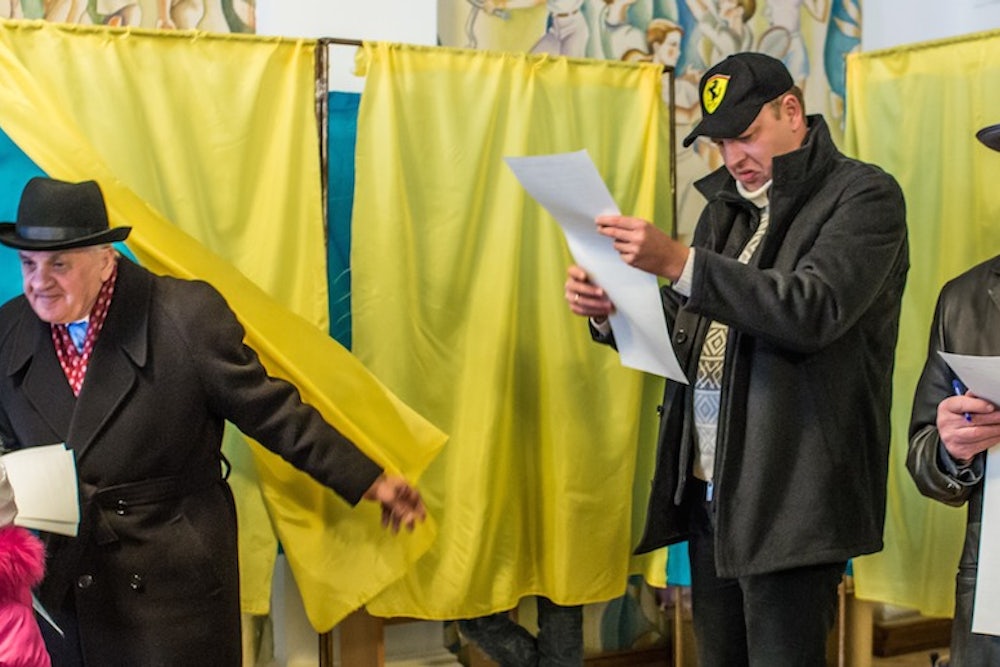As the results of Sunday's parliamentary election in Ukraine roll in, and with them ample speculation about what the new government will look like—coalition negotiations are already well underway—the fact of the election itself is the best reason for temperate hope for the country's future. Fifty-three percent of the electorate turned out for what was by and large a fair vote, despite shelling in some areas. In Donetsk and Luhansk, where the tenuous "ceasefire" has brought little relief from fighting, turnout was just under 33 percent.
Until yesterday, the very same parliament that authorized then-President Viktor Yanukovych's illiberal anti-protest laws in January remained in power. (No wonder a recent poll found that 74 percent of Ukrainians have little or no confidence in parliament.) Ousting those MPs, most of them Yanukovych cronies, was one of the primary goals of the Maidan revolution, more important even than electing a new president. The bad news is that the Opposition Bloc, composed largely of recycled representatives from the pro-Russian Party of Regions, garnered 9.8 percent of the vote, mostly due to continued support in the war-torn eastern regions. It will have a sizable presence in the Rada.
More importantly, however, Ukrainian President Petro Poroshenko and his prime minister, Arseniy Yatsenyuk, can both claim victory—with about 50 percent of ballots counted, their parties are neck-and-neck for the win, at 21.47 percent and 21.62 percent, respectively, according to Interfax. Because neither won a clear majority, they'll have to cut a deal, and the straight-talking Yatsenyuk will almost certainly retain his post as prime minister. The new parliament will be heavily pro-European, but it will not be the "democratic, reformist, pro-Ukrainian and pro-European" utopia that Poroshenko called for; as the Carnegie Endowment's Balazs Jarabic notes, Yatsenyuk and Poroshenko are likely to clash about how to implement reforms, and they'll have to negotiate with the five other parties that passed the 5 percent bar for representation in parliament, among them the Opposition Bloc and Samopomich ("Self-Reliance"), a reformist party led by Andriy Sadovyi, the mayor of Lviv, democratic activist Hanna Hopko, and Donbas Battalion founder Semon Semenchenko, who are expected to form a coalition with Poroshenko's and Yatsenyuk's parties.
Given these results, it will be difficult, but by no means impossible, for Poroshenko to begin to enact the reforms the Ukrainian people have been demanding for so long. A cadre of young activists, including former journalists Mustafa Nayyem, Sergey Leshchenko, and Svitlana Zalishchuk, are part of a new generation of politicians likely to secure seats in parliament; they helped drive the Maidan Revolution, and now they hope to carry out its aims, including changing the parliamentary system and eliminating diplomatic immunity. They have already encountered the corruption and shadiness endemic to Ukrainian politics, and have the stubbornness necessary to change it. Maybe they actually will: Sadovyi has already said that in exchange for joining Poroshenko's coalition and giving the president the majority he badly needs, Samopomich will demand that Poroshenko awards ministerial posts to "the best industry experts" instead of to his "friends, acquaintances, and colleagues."
The election results might also be the best signal that a lasting ceasefire and a gas deal with Russia are soon to come. Russian Foreign Minister Sergei Lavrov has said that Russia will recognize the election results, and the majority parties all seem to agree prioritizing peace over winning back rebel-held territories (former Prime Minister Yulia Tymoshenko's party takes the opposite view, part of the reason for its paltry showing yesterday). Ukraine has made too many painful concessions to the rebels and their funders in Moscow, and there will almost certainly be more to come. Democracy is messy, as President Obama once put it; it only works a fraction of the time. That's a lesson Ukraine is learning all too well.
